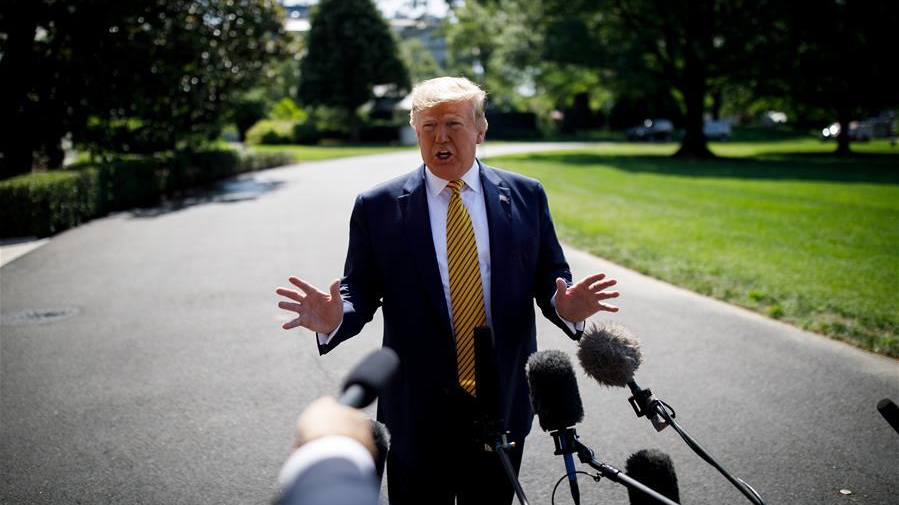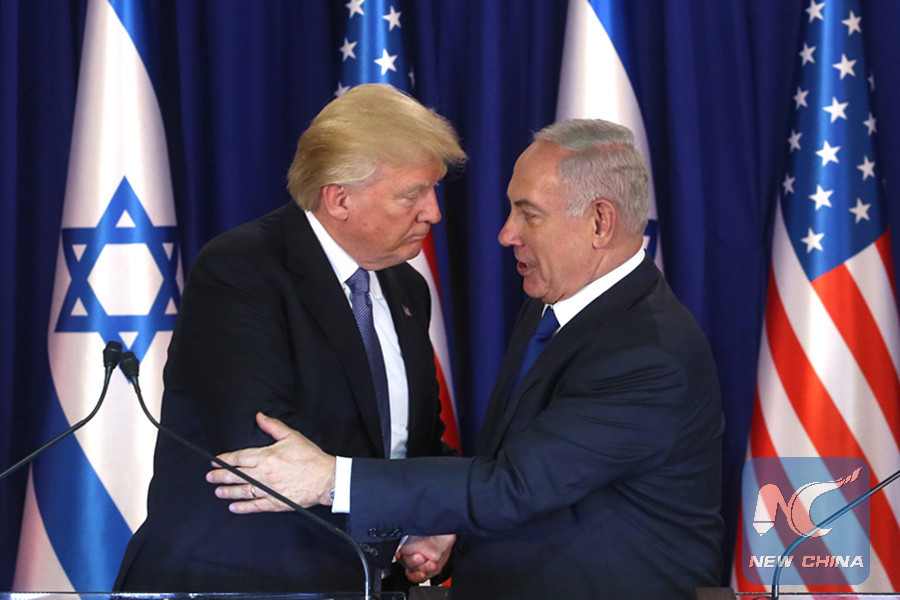
U.S. President Donald Trump speaks to reporters in Washington D.C., the United States, June 22, 2019. /Xinhua
U.S. President Donald Trump speaks to reporters in Washington D.C., the United States, June 22, 2019. /Xinhua
Editor's note: Hamzah Rifaat Hussain is a former visiting fellow at the Stimson Center in Washington, and currently serves as assistant researcher at the Islamabad Policy Research Institute (IPRI) in Pakistan. The article reflects the author's opinions and not necessarily the views of CGTN.
Incentivizing governments, states and regimes to forego the development of nuclear weapons or conduct nuclear tests to attain the common goal of world peace requires a deep understanding of threat perceptions that exist globally.
In the current COVID-19 environment, any chance of a nuclear showdown between states in geographically sensitive regions such as the Korean Peninsula or South Asia would spell nothing short of Armageddon. Yet the Trump administration is once again seen pushing for ending sanction waivers on Iranian nuclear sites, which are bound to provoke Tehran into developing nuclear weapons. If such courses of action do persist, it may eventually lead to Armageddon.
Russian senator Vladimir Dzhabarov recently criticized the decision of the Trump administration to end American sanction waivers for Iranian nuclear sites as a provocation for Tehran to create a nuclear bomb.
This latest move is part of a toxic legacy of the current administration's dealings with the country, stemming back to the withdrawal from the JCPOA deal in 2018 to the assassination of the commander of the Quds force of the IRGC, Qasim Soleimani this year.
The initial deal, which was struck by the Obama administration in 2015 with China, France, Germany, the EU, Russia and the UK being signatories, became a symbol of hope for the non- proliferation regime and sustainable peace in the Middle East which was already grappling with numerous conflicts characterized by clashes of ideologies and proxy warfare.
It also allowed Iran to benefit from sanctions relief in exchange for curbing uranium enrichment with its threat perceptions being allayed.
However, the U.S. withdrawal from the deal in 2018 resulted in Iran's hardliners dictating policies regarding nuclear activities as they became more vociferous in their denunciation of the United States. American refusal to waive economic sanctions on Iran amid the pandemic also contributed to the acrimony and distrust between the two countries.
In all fairness, the Russian senator's assertion on May 28 underlines the undeniable fact that states such as Iran do have threat perceptions which if left unaddressed, would result in greater pursuits of nuclear weapons development and nuclear testing for self-defense.

U.S. President Donald Trump meets with Israeli Prime Minister Benjamin Netanyahu in Jerusalem, May 22, 2017. /Xinhua
U.S. President Donald Trump meets with Israeli Prime Minister Benjamin Netanyahu in Jerusalem, May 22, 2017. /Xinhua
Tehran's threat perception has been augmented by flawed American policies and does not squarely deal with tackling Israel only. Ideologically, Israel's foundation is contested by Tehran with an opaque nuclear weapons facility in the country not being subject to the same condemnation as its civilian program which adds to Tehran's defiance of the United States.
Any prospects of allaying Iran's threat perceptions vis-a-vis Israel could thus, hinge on reconciliation between the two states which so far has not been part of the Trump administration's agenda.
Instead what has been witnessed are tirades and severe castigation directed at Iran's nuclear activities and scant criticism for Israel's policies which contribute to instability such as an increase in settlements on Palestinian territories or pushing for the annexation of the Jordanian valley which all have ideological undertones.
In Iran's case, the blame centers squarely on the Trump administration's approach towards dealing with regimes adamant in developing nuclear weapons. The termination of the waivers granted to Russian, Chinese and European companies to carry out work for example, with the primary aim of making it difficult for Iran to use their nuclear sites for weapons development, has only contributed to the existing narrative regarding the lack of inclusivity in the non-proliferation regime for sovereign states.
While undoubtedly, Iran's quest for developing nuclear weapons are a concern for the entire globe, it is undeniable that cooperation between Russia, China and European states could have allowed the Iranian regime to be coaxed into rescinding its current activities as coercion and threats of imposing sanctions from Washington D.C. proved futile.
Recent history is replete with examples of how other countries have reacted with great alarm at American efforts to curb their nuclear proliferation and testing drives.
The DPRK's defiance in the Korean Peninsula for example is a reflection of how Washington D.C. has neglected the DPRK's threat perceptions where an attempt in Singapore to reach out to Kim Jong Un could not translate into concrete guarantees by the DPRK to refrain from nuclear testing.
Similarly, America's stance towards Pakistan's decision to deploy tactical nuclear weapons to ward off perceived threats from India has not deterred Islamabad from employing an effective deterrent in response to Cold Start. The scant denunciation of India's Cold Start doctrine by Washington D.C. could not allay Pakistani concerns where the nuclear establishment in Islamabad is adamant that state security and threats to national sovereignty will not be compromised on.
The narrative that Pakistan was not the first country to introduce nuclear weapons in South Asia and pressure must be exerted on India instead is similar to how Iran would continue to be defiant if pressure is not exerted on Israel.
On both accounts, Washington D.C. is to blame and more so with the Trump administration at the helms of policy making.
Such selective accountability being sanctioned as state policy in the Middle East and beyond is further weakening global non-proliferation efforts. As threat perceptions grow, states are bound to react upon realpolitik instead of any real consideration for world peace. Current attempts have so far not borne fruit and this latest move on Iran will only contribute to defiance and mistrust in capitals across the globe.
(If you want to contribute and have specific expertise, please contact us at opinions@cgtn.com.)